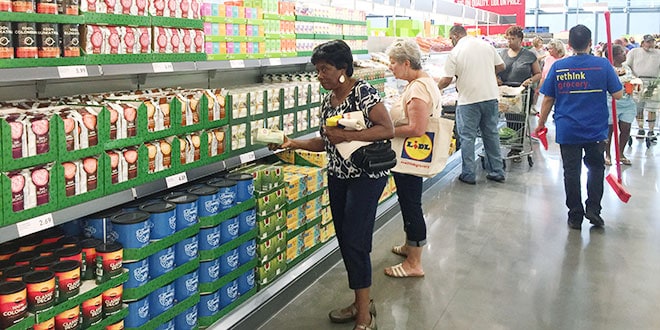Lidl officially opened its first 10 stores in the United States in mid-June and the world’s top retail analysts say the German supermarket chain will seek to have assortments 50% cheaper than its competitors in the United States.
This figure is based on a comparison of products sold in the top supermarkets in the nation. However, in a survey by Kantar Retail in the United Kingdom, it was found that Lidl was on average 15% cheaper than its main competitor, Asda.
This is a big difference with what they hope to achieve in the U.S., which is to be 50% cheaper than its competitors.
Lidl plans to clearly differentiate themselves from their competitor (Aldi) with their 2,000 square foot stores. By offering a larger shopping experience than other “hard discount” grocery stores, Lidl is set on being the main destination for shoppers looking to fill their weekly groceries, but also a destination for those looking to save money on their purchases.
Healthy and sustainable products will be key features since private label products will be trans-fat free and certified.
Lidl will have local products and will be cheaper than its competitors
90% of the assortment will be a private label and 85% of the assortment will be produced in the United States, suggesting that Lidl is trying to attract buyers looking for “made-to-measure” US goods.
Contrary to popular misconceptions, Lidl’s main buyers will position themselves more towards a mid-market buyer, which is consistent with the approach of the grocery store in the United States and other markets.
Related: Lidl Debuts in The U.S. And Surprises Their Customers
Lidl plans to open 100 stores on the east coast by 2018 and reach more than a 120 in the United States by the end of 2018.
It’s expected by the year 2023 that Lidl will have 630 stores opened in the United States, with a clear focus on suburban markets and local stores.
Lidl could generate close to $700 million in sales by the end of 2018, growing to $8,800 million by 2023, as customers begin to move away from other supermarket formats in order to become loyal in “hard discount.”


